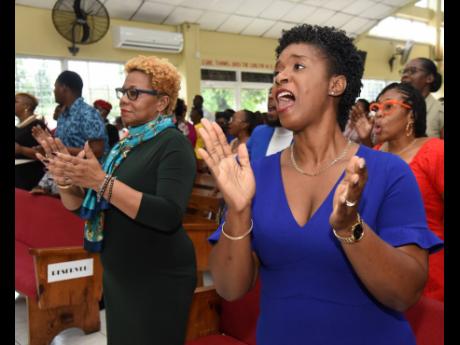Math teachers ‘a bit nervous’ as CSEC exam approaches
... Urge colleagues to embrace tech, revise strategies to boost performances
A stronger focus on student-centred learning and the development of critical thinking skills are critical to drive a turnaround in the Jamaican students’ performance in mathematics at the Caribbean Secondary Education Certificate (CSEC) level,...
A stronger focus on student-centred learning and the development of critical thinking skills are critical to drive a turnaround in the Jamaican students’ performance in mathematics at the Caribbean Secondary Education Certificate (CSEC) level, according to some teachers.
Jamaica’s CSEC mathematics passes have been trending down over the last four years, falling to a dismal 37 per cent pass rate last year.
In 2021, thirty-eight point two per cent of Jamaican candidates attained passing grades of one to three, falling from 61.2 per cent in 2020 and 54.6 per cent in 2019.
Additionally, the last three years have seen a consistent decrease in students’ knowledge and reasoning ability in the subject, with both scoring E, according to the Ministry of Education’s National Mathematics Coordinator Dr Tamika Benjamin.
A number of teachers, who spoke with The Gleaner as the island observes Mathematics Week from March 26 to 31, said an inherent fear of the subject was contributing to the poor grades. This, they agree, was exaggerated by the COVID-19 pandemic, which limited in-person learning and curtailed their teaching techniques.
But with the next CSEC sitting weeks away, the teachers are not sure that students have overcome the learning gap caused by the pandemic as the current grade 11 cohort would have been in grade eight when the pandemic disrupted normal schooling in March 2020.
“In all honesty, based on what has been happening, I don’t think we’ll get the desirable result that we probably want,” Garnet Brooks, a teacher at the Portmore-based Cedar Grove Academy, told The Gleaner.
Asked to share strategies he believed could help fellow educators, he said that the inclusion of technology to make learning more fun could provide students with adequate visual aids to help them to connect with concepts.
His colleague, Viceroy Salmon, who teaches at the Anchovy High School in St James, agreed that the lack of the use of technology in the classroom hampers learning but urged teachers to be innovative.
“We have done it in the past with the little that we have, and we can still do it right now. Students are more hands-on now more than in my time. They are more privileged (with access) to the Internet. They can go on the Internet [and find] resources there,” he said.
“I would suggest that teachers teach mathematics using real-life scenarios, and even for (CSEC) students, we can utilise GeoGebra,” he said, referencing a free online mathematics tool.
And even though he is “currently a bit nervous” about the upcoming exams, Salmon said he believes the teachers have tried their best.
“I believe that our maths teachers have risen to the challenge and they are preparing the students to do exceptionally well in their exams,” he said.
Meanwhile, Brooks also contended that teachers’ attitudes towards teaching the subject can also influence students’ grades in external exams.
“Your personality has a lot to do with it – how you bring across content, how you present yourself, the way you interact with those students, the relationship that you build with them. Those play integral roles in how the students respond to mathematics,” he said.
Herma Smith-Williams, a teacher of 29 years at the Port Morant Primary School, agreed.
“When they (teachers) love maths, they will have the passion to pass it on to their students,” she stated.
Smith-Williams suggested that teachers also change their strategies to allow students to think critically.
“Instead of allowing the children to discover, they tell (them) and they use mainly formula instead of the children discovering the formula and come up sometimes with their own formula,” she noted.
Meanwhile, Benjamin said that the ministry recognises the work it has to do in strengthening students’ knowledge in the subject area and to help students develop and apply their reasoning ability.
“But we’re also recognising that our teaching strategies – in particular, that push to change – that have to be consistent to bring the level of increase we want to see in the reasoning competency,” she told The Gleaner, adding that this should be done at all levels.
To this end, she said the ministry has been encouraging teachers to increase student engagement with lessons centred around critical thinking.
Benjamin said despite the low grades over the last few years, she remained cautiously optimistic about this year’s performance.
“Every year is a different set of students, and every year our teachers have more experience and go through more training. The fact is, though, we are still coming out of the pandemic and the set of students who are doing CSEC this year, … what I normally do in terms of managing expectations (is) to look at how the pandemic would have affected those students,” she said.

